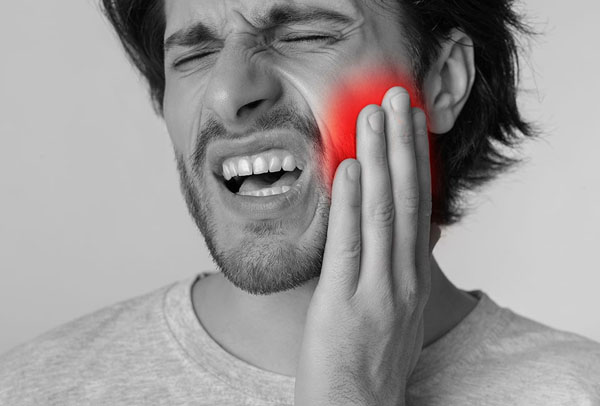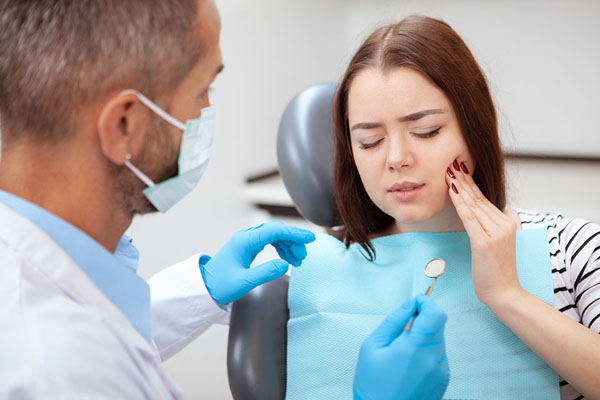Degenerative Joint Disease Treatment in Knoxville, TN
Find Relief from Jaw Pain With Our Knoxville Dentist
Are you experiencing chronic jaw pain, facial discomfort, or difficulty opening your mouth? You’re not alone. Millions of Americans suffer from temporomandibular joint (TMJ) disorders, with degenerative joint disease being one of the most common causes of persistent jaw pain and dysfunction.
If you’re dealing with TMJ disorder symptoms, contact our experienced TMJ dentist in Knoxville, TN, today at (865) 687-8670. We provide individualized care and comprehensive treatment plans to help you find lasting relief from jaw pain.
What Is Degenerative Joint Disease?
Degenerative joint disease, commonly known as osteoarthritis of the temporomandibular joint, occurs when the protective articular cartilage in your jaw joint begins to break down over time. This progressive condition affects the joint function between your jawbone and skull, leading to bone-on-bone contact that can cause significant discomfort and limit your daily activities.
When the cartilage that cushions your jaw joint deteriorates, it creates inflammation in the affected joint, resulting in chronic pain, stiffness, and reduced jaw movement. Understanding this condition is the first step toward finding effective relief and restoring your quality of life.
Common Causes and Risk Factors of TMJ Degenerative Joint Disease
Several factors can contribute to developing osteoarthritis in your temporomandibular joint. While the exact cause varies from person to person, research has identified key risk factors that increase your likelihood of experiencing this condition:
- Age-Related Changes: As we age, the natural wear and tear on our joints becomes more pronounced. The cartilage in your jaw joint may gradually thin and lose its shock-absorbing properties, making degenerative changes more likely.
- Jaw Injury and Trauma: Previous jaw injuries, including fractures, dislocations, or impact trauma, can damage the joint structure and accelerate cartilage breakdown. Even seemingly minor injuries can have long-term effects on joint health.
- Chronic Jaw Overuse: Repetitive stress from teeth grinding (bruxism), jaw clenching, excessive gum chewing, or habitual jaw movements can place excessive pressure on your temporomandibular joint, leading to premature cartilage wear.
- Genetic Predisposition: Some individuals inherit a higher risk for developing joint disease due to genetic factors that affect cartilage strength, joint structure, or inflammatory responses.
- Secondary Conditions: While degenerative joint disease differs from rheumatoid arthritis, both conditions can affect joint health. Other systemic conditions may also influence your risk of developing TMJ disorders.
Regenerative TMJ Degenerative Joint Disease Symptoms
TMJ disorder symptoms can vary significantly between individuals, but recognizing the warning signs early can help you seek timely treatment from a qualified dentist near you. Common symptoms include:
Primary Jaw Symptoms
- Jaw joint pain or tenderness, especially when chewing or speaking
- Limited jaw movement or difficulty opening your mouth fully
- Joint stiffness that’s particularly noticeable in the morning
- Clicking, popping, or grinding sounds when moving your jaw
- Jaw muscles that feel tight or fatigued
Secondary Symptoms
- Facial pain that may radiate to your cheeks, temples, or neck
- Chronic headaches or migraines
- Earaches or a feeling of ear fullness
- Neck pain and shoulder tension
- Swelling around the jaw area
Don’t let TMJ pain control your life. Call our Knoxville dental office at (865) 687-8670 to schedule a comprehensive evaluation with our TMJ dentist.
Comprehensive TMJ Degenerative Joint Disease
Modern TMJ treatment focuses on reducing pain, restoring joint function, and preventing further cartilage damage. Our dentist in Knoxville, TN, offers multiple treatment approaches tailored to your specific needs:
Conservative Treatment Approaches
- Pain Management: Over-the-counter medications like ibuprofen can help reduce pain and swelling in the affected joint. For severe cases, prescription pain relievers or anti-inflammatory medications may be recommended to provide relief.
- Physical Therapy: Specialized physical therapy programs designed for TMJ disorders can strengthen jaw muscles, improve range of motion, and teach you techniques to reduce joint stress. These exercises are particularly effective for restoring normal jaw movement patterns.
- Oral Appliances: Custom-fitted mouth guards or splints can protect your teeth from grinding while reducing pressure on your temporomandibular joint. These devices are especially helpful for patients who clench or grind their teeth during sleep.
Advanced Treatment Options
- Minimally Invasive Procedures: When conservative treatments don’t provide adequate relief, procedures like arthrocentesis (joint irrigation) or keyhole surgery using specialized surgical instruments can help remove inflammatory debris and improve joint function.
- Comprehensive Surgical Intervention: For severe cases where cartilage damage is extensive, more advanced surgical procedures may be necessary to restore joint function and eliminate chronic pain.
Why Choose a Knoxville Dentist Near You for Local TMJ Treatment?
Choosing a local TMJ dentist in Knoxville, TN, offers several advantages for managing your degenerative joint disease:
- Convenient Access: Regular follow-up appointments are easier to maintain when your dentist is nearby
- Community Understanding: Local practitioners understand the specific needs of Knoxville residents
- Coordinated Care: Easy collaboration with other local healthcare providers when needed
- Emergency Support: Quick access to care during TMJ flare-ups or complications
Our dental practice proudly serves Knoxville and surrounding communities, including Amherst, Marble City, West Knoxville, and beyond.
Preventing TMJ Degenerative Joint Disease Progression
While you can’t completely prevent degenerative joint disease, you can take steps to reduce your risk and slow its progression:
- Maintain Good Posture: Proper head and neck alignment reduces strain on your jaw joint
- Use Stress Management: Techniques like meditation or yoga can reduce jaw clenching
- Avoid Hard Foods: Minimize stress on your jaw by choosing softer food options
- Practice Jaw Exercises: Gentle stretching and strengthening exercises promote healthy joint function
- Wear Protection: Use a mouth guard during sports or if you grind your teeth at night
Frequently Asked Questions
Yes, dentists with specialized training in TMJ disorders are often the best first choice for diagnosis and treatment. Our Knoxville dental team has extensive experience in managing TMJ conditions and can provide comprehensive care from initial diagnosis through advanced treatment options.
Proper diagnosis requires a thorough examination, including X-rays and potentially other imaging studies. While several factors can cause jaw pain, degenerative joint disease typically involves progressive symptoms that worsen over time without treatment.
Coverage varies by insurance plan and specific treatments required. Our office staff can help verify your benefits and discuss payment options to make treatment affordable and accessible.
Find Relief from TMJ Pain with High-Quality Care in Knoxville
Chronic jaw pain and TMJ disorder can be managed with the right treatment. Our Knoxville, TN, dental team uses advanced diagnostic techniques and effective methods to provide relief from TMJ symptoms. We focus on individualized care to restore your quality of life.
Don’t let TMJ pain dominate your days. Contact our dental practice in Knoxville today at (865) 687-8670 for a comprehensive consultation. We serve patients in Knoxville, Amherst, Marble City, West Knoxville, and surrounding areas. Take the first step toward a pain-free future—invest in your jaw health and well-being with proper TMJ treatment.


